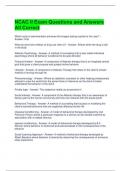Exam (elaborations)
NCAC II Exam Questions and Answers All Correct
- Course
- Institution
NCAC II Exam Questions and Answers All Correct Which route of administration achieves the longest-lasting results for the user? - Answer- Oral What do short-term effects of drug use refer to? - Answer- Effects while the drug is still in the body Alderian Psychology - Answer- A method of c...
[Show more]



